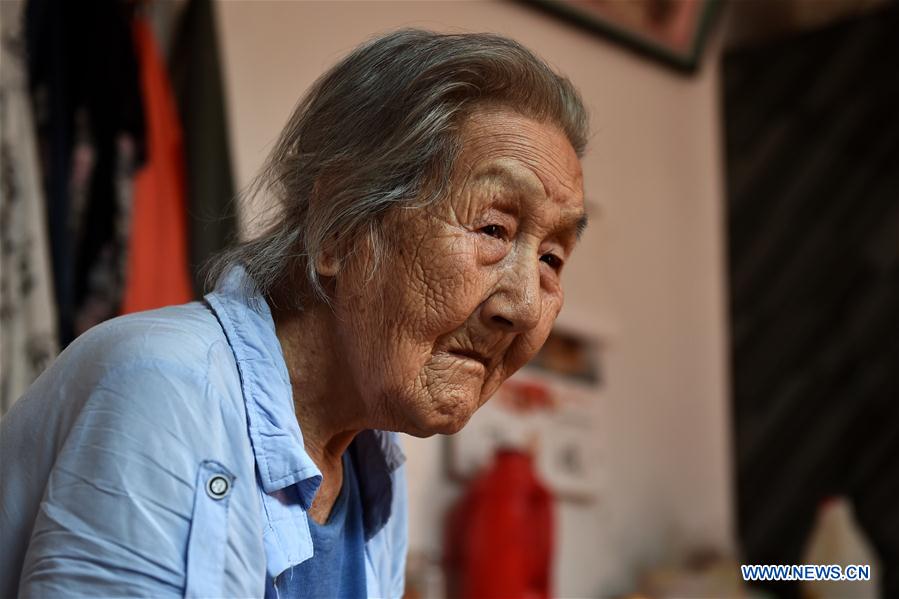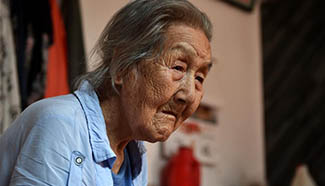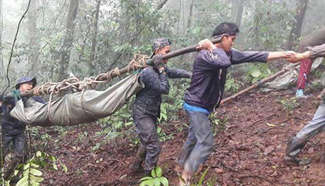
Cao Heimao, a 94-year-old woman who was forced to serve as a "comfort woman" during the Second World War, sits in her house in Qidong Village of Yuxian County, north China's Shanxi Province, Aug. 5, 2016. Monday marked the 71st anniversary of Japan's unconditional surrender at the end of World War II. Some 400,000 women in Asian were made into comfort women for the Japanese army during WWII, nearly half of which are Chinese, according to a research center of comfort women under the Humanities and Communication College of Shanghai Normal University. Since 1990, some 100 surviving comfort women began to speak publicly about the atrocities they suffered from the Japanese invaders during the war and sought legal actions. They have continued to push for the cause despite being in old age and suffering from poverty and disease. (Xinhua/Zhan Yan)
TAIYUAN, Aug. 15 (Xinhua) -- Hao Yuelian, 88, will never forget the nightmare seven decades ago when she was tied with rope in a brothel and forced to have sex with Japanese invaders.
Countless rapes during the war left her infertile, and she has lived alone on government aid since her husband's death.
"I'll struggle to live, waiting for Japan to acknowledge the crime and apologize," said Hao, from Yanggongling Village in Wuxiang County of north China's Shanxi Province.
Monday marks the 71st anniversary of Japan's unconditional surrender in World War II.
As the number of "comfort women," or sex slaves, like Hao becomes smaller and smaller, Chinese campaigners realize time is running out to get an apology from Japan and seek justice for them.
Campaigner Zhang Shuangbing, a retired teacher, has sued the Japanese government on behalf of the surviving "comfort women" and sought government aid for them for 34 years.
Of the 129 comfort women victims Zhang has on record in the province, 122 have died. The remaining seven, with an average age of over 90, all suffer from haunting memories, miserable living conditions and poor physical health.
NIGHTMARE
Hao was only 15 when she was first raped on June 13, 1943.
She was at home alone while her parents were out farming, when two Japanese soldiers raided the house.
"With their guns pointed at me, I did not dare to utter a word," she recalled, adding one soldier stripped her naked and raped her, followed by the other.
She wrapped herself in a quilt and stayed in bed all day. Several Japanese soldiers rushed in after the sunset, tied her with rope, and took her away together with a dozen men and women from the village.
"Ordering the women to watch from the side, they tortured the men with sticks, red-hot irons and wolfdogs. Some of them were bitten to death," she said.
Six to seven women, including Hao, were locked in a dirty straw house, which served as a military brothel.
A month later, Hao's family bought her freedom after a fellow villager tipped them off, but the Japanese later forced her back until another two months later, when her father and brother sneaked into the house and rescued her.
"Years later, when I finally got married at the age of 18, I found I was no longer able to have children," she said.
HISTORY MUST BE REMEMBERED
Research shows some 400,000 women in Asia were forced to be "comfort women" for the Japanese army during World War II, nearly half of whom were Chinese.
Su Zhiliang, director of a research center on comfort women under the Humanities and Communication College of Shanghai Normal University, said the number of Chinese who identified themselves as comfort women for Japanese troops during WWII has fallen to only 20.
"There is no doubt that the best time for systematic investigation into the suffering of comfort women has passed, but there is still hope for obtaining more evidence and materials if we act now," Su said on Sunday at a museum in the eastern city of Nanjing, located at the former site of a Japanese military brothel.
To record the history, Su's team is researching the experience of comfort women in 22 provinces in China. NGOs from China, the Republic of Korea, Japan, the Philippines and other countries and regions are working together to nominate documentation on comfort women for inclusion on the Memory of the World Register, established by UNESCO in the 1990s to preserve the world's most important documents.
"Despite the years that have passed, it's still as though it has just happened," said Liu Fenghai, 89, from Nanyuan Village of Qinxian County, Shanxi Province.
She and another woman were forced to be comfort women in 1943 and later abandoned in a valley after catching a disease. The two managed to walk home, helping each other.
"We can't forget, and we'll never forget," she said, wiping tears away with bony hands.
Zhang Shuangbing wrote to the Japanese government in 1992, demanding compensation of 100,000 U.S. dollars for each comfort woman. Receiving no response from Japan, he helped the women take legal action beginning in 1995. The suit lasted more than a decade and ultimately failed.
"Losing the lawsuit was quite a blow for the women. But as long as they are still alive, they will not stop seeking justice," he said.










